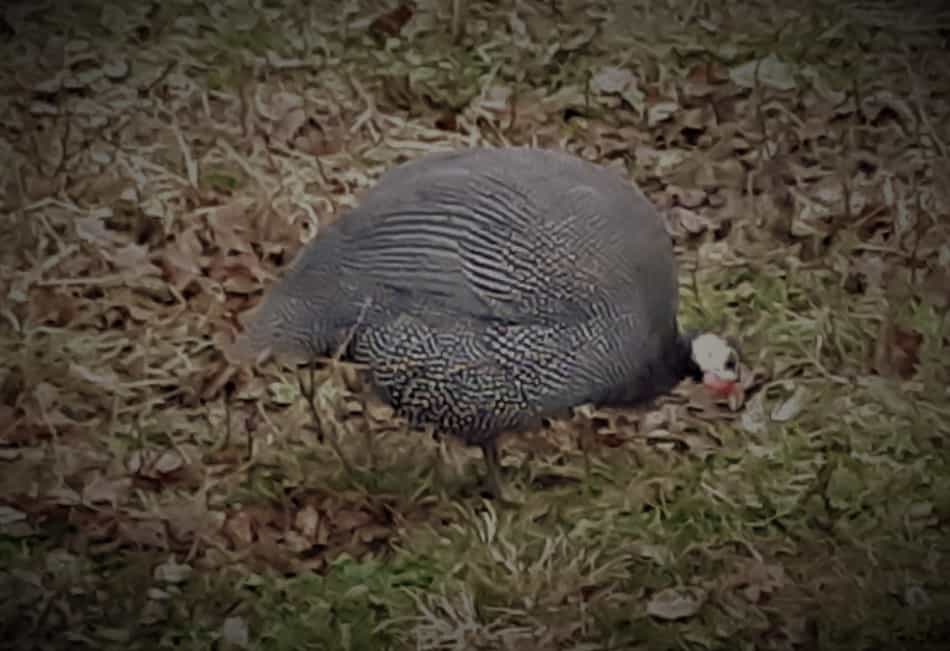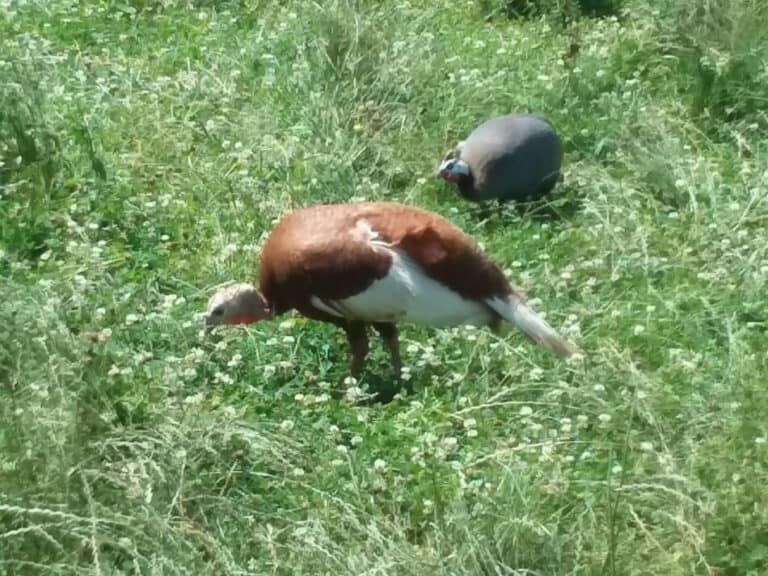Guinea Fowl: Cost To Purchase And Raise Them

Interested in raising some birds and looking for something different than chickens or ducks?
Consider the guinea: a hardy and unusual bird (in both looks and behavior), that does well on small farms.
Guinea fowl cost $4.75-6.75 each and need $8-10 of feed (25 pounds of high protein feed) to reach adult size. Adult guineas need 5.5 pounds of 16% feed per month each, which will cost $1.60/guinea/month.
Guinea fowl are definitely different than most other birds around the farm. They are very loud, capable and mobile. They frequently roost in trees or the rafters of the barn.
Additionally, the hen can incubate and hatch a stunning amount of keets, 18-20 is pretty normal.
| Cost to buy keets | $4.75-6.75 |
| Pounds of feed needed to raise to adult size per guinea | 25 pounds |
| Cost of guinea appropriate feed | $0.42-0.32 per pound |
| Cost to raise guinea to adult size | $8-10 each |
| Cost to feed adult guineas per month | $1.60 each |
The other side of having guineas is the less glamorous stuff, like being horrendous moms.
While they are great at sneaking off and building nest in the tall grass, to keep the nest and the babies safe, they are the worst at taking care of the hatchlings.
Have a brooder area set up and gather the keets. The parents will be mad about it, but those babies will be all dead in the next two or three days if you don’t, not kidding.
Also, if you have an incubator and can find the nest, grab the eggs still left in the nest, and put them in the incubator-quite a few of them will still hatch.
Another adult guinea specialty: They also seem to be everywhere. Here’s an example:
I have a YouTube channel that goes with this blog and you’d be shocked the number of times we’re filming, chickens, the cow, pigs-whatever, and you can hear a guinea chattering in the background!
Instead of considering the guinea in the video odd, it’s now just a normal part of most of them!
What hatchery should I pick for guineas?
Guineas are available at most chicken hatcheries, so choices are plentiful. That’s the good news.
The bad news is that you’ll have to look into the specific hatchery yourself to see if it provides what you need.
I would go to a local hatchery if at all possible. You can pick up the keets (baby guineas) right away and get them started at your house sooner, which is better for them, than if they are shipped to you.
If ordering keets is the way to go for you, read my article How To Choose A Chicken Hatchery.
I know it will have a chicken focus, but it will be worth the read since all of the things you need to consider when buying chicks are the same for buying guinea keets.
How much will the keets cost?
There is a bit of a price spread for the day old keets, depending upon which hatchery and color you choose.
Overall, most places are pretty close for the most common color, which is pearl.
The other more unusual colors like lavender, coral blue or royal purple will cost you $1.00-1.50 more per keet.
Is it worth the extra money? If the more unusual colors call to you, maybe so. If you are planning on eating them, probably not.
What feed do the keets need?
| Age of the guinea | Feed needed-Non Medicated! |
| Up to 5 weeks | 28% protein (game bird starter) |
| 5-8 weeks | 20% protein (chicken feed) |
| 8 weeks + | 16% protein (chicken feed) |
The keets need a higher protein feed for the first 5 weeks, get 28% non medicated.
This is more of a game bird starter (and will be more money), but it will get the keets off and growing.
A percent or two lower in protein will still work, if that is your only choice, but do not use medicated feed!
The starter will cost you $30-35 per 50 pound bag. That’s high compared to most starter bird feeds, but it’s what they need to grow well.
After 5 weeks you can drop the protein down to 20% (non medicated) or so, which will also drop the price to $18-20 per 50 pound bag.
Once the keets hit 8 weeks or more they need to have 16% (non medicated) feed available, this will be more in the $16-18 per 50 pound bag range.
You’ll want to keep them on this feed until they reach full size.
Getting your feed from a feed mill
A bonus for anyone who lives near a feed mill (a place that sells feed they grind on site), once you get to the 20% non medicated feed level you can drastically drop your feed costs if you buy from a feed mill.
In my experience, the feed mill bulk bags are a little bit more than half the cost of the 50 pound brand name feeds! That’s a huge savings!
Most mills would not have on hand a game bird starter in bulk, they just don’t sell enough of it to keep it ready.
But, once the keets get a bit older, they would need the same feed as growing chicks and that will be on hand at the mill.
Word to the wise: bulk bagged feed comes in 100 pound bags, not 50 pounders.
One of the feed mills we get feed from has switched to 80 pound bags, since they are easier to manage, but count on 100 pounders until you find out otherwise.
What feed do the adult guineas need?
As long as they have plenty of bugs and greens to pick around at, none.
However, once the frost hits and the pickings in your yard or pasture get slim, now they need supplemental feed.
Give them a 16% chicken feed, non medicated of course.
The will still go out and look for bugs, and anything else interesting, but they won’t come across much again until spring.
When the bugs start showing up again, the guineas won’t need you to feed them for a while, until then give them the feed.
Do guinea fowl eat ticks?
Yes. Guineas zoom around and eat whatever bugs they find, they don’t get too picky. They do eat ticks, but not exclusively.
4 Backyard Birds That Love To Eat Ticks shows goes over your tick eating options.
Guineas do not hunt down ticks, passing up other snacks along the way. They are opportunists, if they find it, they eat it. It’s really that simple.
If you are expecting to get a tick free yard or pasture, think again.
We have had gunieas running loose around our farm for years and we still see ticks.
I’m sure the guineas are eating all the ticks they come across, but it isn’t total annihilation. We still pull ticks off the dogs.
It’s only fair to point out that the larger the acreage, the less likely the guineas are going to get all of the ticks eaten.
Guineas certainly do range around, looking for new snacks. They seem to like staying closer to the barns and rarely if ever make it out to the far corner of the farm fields.
What do guineas eat in the winter?
In the winter, you’ll need to feed your guineas some grain. It’s not that they need grain specifically, it’s that they need more calories and the easiest way to get those calories is grain.
They could also eat birdseed (more expensive than feed) or kitchen scraps, whatever works for you.
Whenever their main source of food shuts down for the season, in this case your yard isn’t producing bugs anymore, you’ll have to provide feed.
Do guineas eat ants?
Yes, guineas will eat ants, but they will not only eat ants. As written above in the tick section, guineas are opportunists.
If they run across ants, they’ll eat them. Otherwise, they’ll keep moving looking for something else to eat.
Do guineas eat plants?
Yes, guineas will eat plants, like the dandelion greens in your yard. However, they can not live on plants alone, they won’t get enough nutrition from a diet of just plants.
If what you are asking is will they eat and scratch up my garden like a chicken, no, they won’t.
Guineas will eat off newly sprouted seedlings, since they are small and tender.
Once the plants get some growth on them, the guineas are just poking around for bugs.
